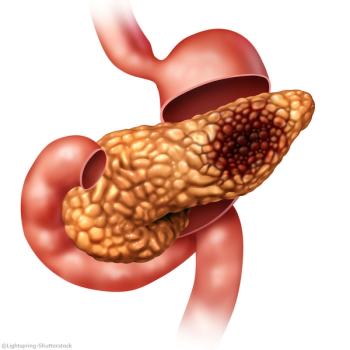
Oncology NEWS International
- Oncology NEWS International Vol 14 No 3
- Volume 14
- Issue 3
Erlotinib/Gemcitabine Ups Survival in Advanced Pancreatic Cancer
This special “annual highlights” supplement to Oncology News International (ONI)is a compilation of selected news on important advances in the management ofgastrointestinal cancers over the past year, as reported in ONI. Guest Editor, Dr.James L. Abbruzzese, comments on the reports included herein and discussesdevelopments in the clinical management of GI cancers, with a look at the impactof targeted agents with cytotoxic chemotherapy, first-line and adjuvant therapies foradvanced disease, and the role of statins and COX-2 inhibitors in prevention.
HOLLYWOOD, Florida-Arandomized phase III clinical study oferlotinib (Tarceva) in combinationwith gemcitabine (Gemzar) met itsprimary endpoint of improving survivalin patients with locally advancedor metastatic pancreatic cancer, comparedwith patients receiving gemcitabineplus placebo. These results froma phase III trial were reported at the2005 Gastrointestinal Cancers Symposium(abstract 77).The international study randomized569 patients to receive either gemcitabineplus concurrent erlotinib at100 mg/d or 150 mg/d, or gemcitabineplus placebo. The results showed a19% decrease in the risk of dying frompancreatic cancer for the combinationchemotherapy, compared withgemcitabine/placebo (hazard ratio0.81, P = .025). Median overall survival and 1-year survival in the erlotinib/gemcitabine group were 6.37 monthsand 24%, respectively, compared with5.91 months and 17% in the gemcitabine/placebo arm (see Figure 1). Improvementin progression-free survivalwas also significant, even though therewas no significant difference in tumorresponse between the two groups.
A preliminary safety analysis didnot show any unexpected adverseevents beyond those seen previouslywith erlotinib. As expected, rash anddiarrhea were the principal erlotinibrelatedside effects.The study was sponsored by OSIPharmaceuticals and coordinated bythe National Cancer Institute of CanadaClinical Trials Group at QueensUniversity. Malcolm J. Moore, MD, ofthe Princess Margaret Hospital, Toronto,reported the results.
Articles in this issue
almost 21 years ago
Smoking Speeds Progression of Pancreas Caalmost 21 years ago
Alcohol, Obesity, and Smoking Risk Factors for HCCalmost 21 years ago
Adding Bevacizumab Improves Response to Oxaliplatin Regimensalmost 21 years ago
Capecitabine Promises Convenience, Efficacy in LARC, Five Studies Showalmost 21 years ago
Avastin Enhances FOLFOX Efficacyalmost 21 years ago
Panitumumab, Anti-EGFR MoAb,Promising in Colon Canceralmost 21 years ago
Oxaliplatin/Gemcitabine Effective in Advanced Pancreatic Canceralmost 21 years ago
Study Strengthens Evidence of Link Between Liver Cancer and Diabetesalmost 21 years ago
Capecitabine Promises Convenience, Efficacy in LARC, Five Studies ShowNewsletter
Stay up to date on recent advances in the multidisciplinary approach to cancer.




































